
Jul 28, 2015
Up to 6,000 workers have been terminated over the past week in Zimbabwe, following a Supreme Court decision stating that companies can now unilaterally end workers’ contracts at any time, without offering them layoff benefits, by giving them three months’ notice.
The mass job cuts “are part of a scramble by companies to fire workers without benefits as they capitalize on last Friday’s Supreme Court ruling,” according to one news source.
“The onslaught is ongoing and from the low-ranking workers, companies will target the middle managers,” says Zimbabwe Congress of Trade Unions (ZCTU) Secretary General Japhet Moyo. “No one is safe in this except shareholders.”
The ZCTU is asking Zimbabwe President Robert Mugabe to take immediate steps to halt the terminations. The government said it plans to amend the relevant provisions of the Labor Act to address the crisis, but that process is too lengthy, says ZCTU. A local Zimbabwe news source reports that the government is appealing to employers to exercise maximum restraint in terminating contracts of employment on notice.
“We have decided to terminate your employment contract on notice,” reads one typical termination letter. “This is not a dismissal but rather the exercise of our right under common law which allows either party to terminate the employment contract on notice.” A sample of letters the Solidarity Center reviewed shows employers from a variety of companies are using the same language to unilaterally negate formal employment contracts, reflecting the Supreme Court’s decision.
More than 72 percent of Zimbabweans live in poverty, and the vast majority of the country’s nearly 15 million people are not employed in the formal economy. Some 94 percent of those age 15 years and older who are employed work in the informal economy, according to the Zimbabwe 2014 Labor Force Survey. Rather than creating opportunities for stable, decent jobs in the formal sector, the ruling creates further economic destabilization.
The Supreme Court of Zimbabwe ruling came in a case brought by Kingstone Donga and Don Nyamande, who cited unfair dismissal and contract termination by their former employer, Zuva Petroleum. The employees argued that the Labor Relations Act had abolished the employer’s common law right to terminate an employment contract on notice. The court agreed with the employer.
In another landmark decision, the Supreme Court ruled yesterday that employers could withdraw housing, school fees and other allowances unless they were part of an existing collective bargaining agreement because they are not mandatory. Preliminary reports indicate that the ruling may result in the withdrawal of worker allowances across the country.
“There is a genuine fear that these rulings are taking labor relations in the country back more than 30 years, eroding all the progress made since independence from Britain in 1980,” says Ashbel Musaringo, Solidarity Center senior program officer in Zimbabwe. “Provisions of the Labor Act are being overridden by these Supreme Court rulings leaving workers completely at the mercy of employers.”
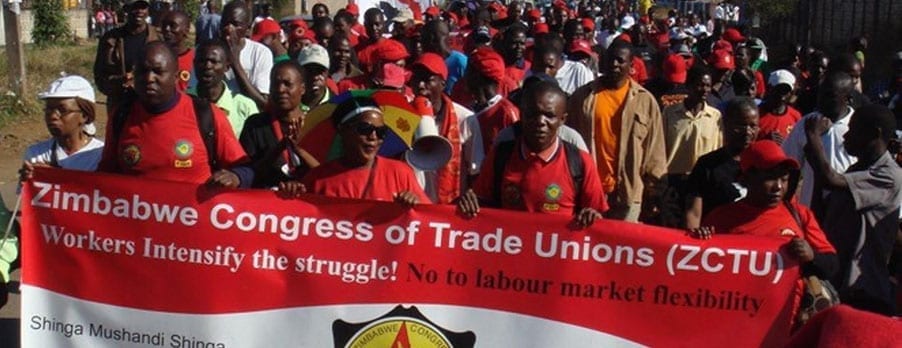
Jul 22, 2015
The Supreme Court of Zimbabwe upheld a decision late last week stating that companies can now terminate workers’ contracts at any time, without offering them layoff benefits, by giving them three months’ notice.
The unanimous decision “has grave consequences for anyone under formal employment,” according to one news source and comes “at time when business is crying for flexible labor laws in order to improve industrial competitiveness,” according to another analysis. Employers often use the term “flexible” as a euphemism to describe workplace policies that benefit management at the expense of working people.
Noting that many jobs already have been lost in the days after the court ruling, the Zimbabwe Congress of Trade Unions (ZCTU) said in a statement that the judicial action is the latest in a series to “casualize” workers—that is, create an environment in which formal-sector workers, like those working in the informal economy, have few workplace rights
“The ruling will have an adverse effect of destroying the gains achieved over the past 35 years, with far-reaching economic” consequences, ZCTU said. Zimbabwe’s union movement is planning street protests until the government takes action to resolve the issue.
The case was brought by Kingstone Donga and Don Nyamande, who cited unfair dismissal and contract termination by their former employer, Zuva Petroleum. The employees argued that the Labor Relations Act had abolished the employer’s common law right to terminate an employment contract on notice. The court agreed with the employer.
More than 72 percent of Zimbabweans live in poverty, and the vast majority of the country’s nearly 15 million people are not employed in the formal economy. Rather than creating opportunities for stable, decent jobs in the formal sector, the ruling creates further economic destabilization.
Under Zimbabwe’s Labor Act, “every employee has the right not to be unfairly dismissed,” and the law details the process employers must follow when seeking to terminate an employee.
One analyst notes that employers will still need to exercise caution when they terminate employment on notice because there is still scope for them to be challenged on grounds of unfair dismissal. For example, a group of employees fired when pregnant would have cause to bring a discrimination suit for unfair dismissal.

Jun 26, 2015

Street vendors in Harare delivering their petition. Credit: Patience Maria, Musaringo
Street vendors in several Zimbabwean towns were evicted today, following a June 26 deadline to remove their stalls in the city centers and set up in government-approved areas. Government officials warned that force could be used if they refuse.
Although Harare street vendors have so far resisted eviction, the future is uncertain, says Wisborn Malaya, secretary general of the Zimbabwe Chamber of Informal Economy Associations (ZCIEA).
“So, it is not good news,” he said.
Local authorities evicted street vendors in the towns of Chivhu, Chinhoyi, Gwanda and Marondera, after vendors refused to relocate because there are not enough places for all of them, Malaya says.
Vendors are joining together to oppose the evictions and build strength to achieve fundamental labor rights through the association, whose membership has risen from 177,000 to more than 190,000 since the eviction campaign began.
Hundreds of street vendors took to the streets of Harare earlier this week to deliver a petition to Parliament against eviction orders. Street vendors in Harare today spilled out across the sidewalks and streets in defiance of the order.
“We hope the government will concede not to be brutal to the people so there is not punishment of the people who are trying to earn an honest living,” says Malaya. “(But) vendors are vowing to stay on the streets and take what must come.”
Vendors also face other challenges, he said. “Some of these places, especially in the major cities have been taken over by ‘barons’ who occupy the space and charge the vendors rent. They want to make money out of the people.”
ZCIEA represents informal traders, including street vendors, cross-border traders, tailors, home welders and carpenters in 30 territories across Zimbabwe.
With few formal sector jobs available in Zimbabwe—as in much of the world—the vast majority of the country’s nearly 15 million people are employed in the informal economy, and the number of street vendors is increasing exponentially.
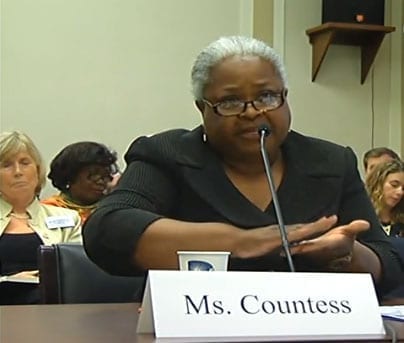
Jun 4, 2015
Zimbabwe’s economy is in deep decline, making it harder for average Zimbabweans to work and live, and leaving them less and less confident in their future, according to Solidarity Center Regional Program Director for Africa Imani Countess, in testimony yesterday on Capitol Hill.
“Most workers earn salaries far below the poverty level, and many workers—even in the formal sector—go for months without receiving their wages,” Countess said. (Read her full testimony here.)
Countess was among three panelists speaking at a hearing on the Future of U.S.-Zimbabwe Relations, held by the U.S. House Subcommittee on Africa, Global Health, Global Human Rights, and International Organizations.
She cited a recent AfroBarometer survey of 2,400 randomly selected participants that details the extent of Zimbabwe’s economic crisis:
- 33 percent of respondents in urban areas had gone without food at least once this year.
- 52 percent in urban areas had gone without medical care.
- 59 percent in urban areas had gone without water.
- Nearly two-thirds say “unemployment is the biggest problem government should address.”
According to the Zimbabwe Congress of Trade Unions, Countess said, “most human rights defenders, like trade unions and civic organizations have been severely weakened due to economic decline as well as brain drain.”
Countess told lawmakers that Zimbabwe labor unions and workers are looking for U.S. policy that includes strong support for human rights defenders and community-based, mass organizations that work to educate and organize citizens around a rights-based culture. Zimbabwe unions also seek U.S. support to provide stronger protection for informal economy workers, that in turn, can positively influence the flow of economic migrants.
Other panelists included Shannon Smith, U.S. State Department deputy assistant secretary for the Bureau of African Affairs and Ben Freeth, Mike Campbell Foundation executive director.
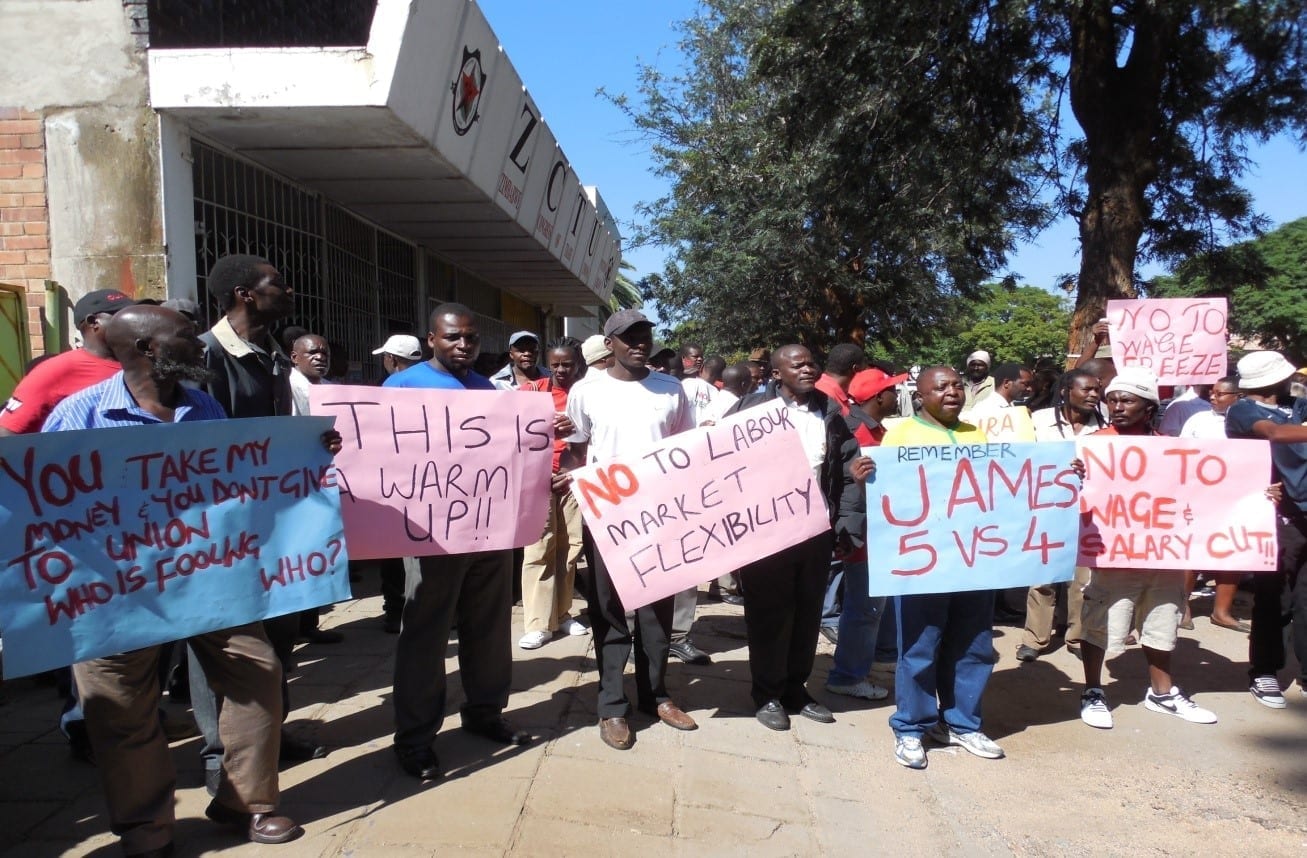
Apr 13, 2015
Fed up with unpaid wages, salaries that are below the poverty line, few jobs available in the formal sector and a proposed wage freeze, Zimbabwe workers took to the streets in six cities Saturday to demand workers be paid and to petition the government to not arbitrarily change the labor law to empower employers to fire workers.
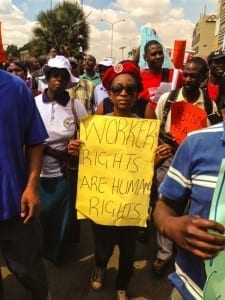
Workers rallied in cities across Zimbabwe Saturday. Credit: Thando Khoza
Carrying signs reading “Worker rights are human rights,” and “This year, we are not backing down,” workers presented government officials with a petition demanding officials honor their pledge to create 2 million jobs and rethink the introduction of so-called labor market flexibility, in which the brunt of economic reform falls on workers. (Read the full petition.)
“Senior government officials, including the minister of finance, want to turn the worker into a form of cheap labor,” Zimbabwe Congress of Trade Unions (ZCTU) President George Nkiwane said at the rally. “While it is the ordinary worker that is being made to suffer, the government is not taking any meaningful action on chief executives who are bleeding the economy by paying themselves huge salaries and perks.”
Wages average less than $250 a month—for the 30 percent of the population working in the formal economy—while the cost of living is as high as in New York City. Some 72 percent of the population lived below the poverty line in 2013. Increasing numbers of Zimbabweans are forced to seek a living in informal economy jobs like street vending, in which they have no income security and few, if any, social benefits like health care.
“We used to have over 1.5 million workers in the formal sector 10 years ago, but we would be lucky if we have 700,000 in the formal sector (today),” Nkiwane said.
Women are disproportionately represented in poor-paying informal economy jobs, and young workers in urban areas also lack jobs that pay a living wage, the ZCTU petition noted. Employers also increasingly subcontract dangerous jobs, and so avoid paying compensation to workers injured or made ill while on the job, the petition stated.
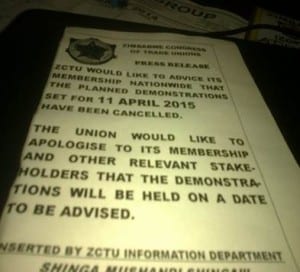
Fake press releases and pamphlets were distributed in advance of the rally, falsely stating the rallies had been cancelled. Credit: ZCTU
Protestors turned out in Bulawayo, Chinhoyi, Gweru, Harare, Masvingo and Mutare despite a campaign to fool workers into thinking the rally had been cancelled. Fake press releases and pamphlets, purportedly from ZCTU, were distributed in several cities in advance of the rally, telling workers it had been canceled.
The march took place in an increasingly threatening environment for activists. Last month, Itai Dzamara, a leading pro-democracy advocate, was abducted. He remains missing, and leading civil society organizations—including the ZCTU—are calling on the government to ascertain his whereabouts and prosecute his abductors.
Police in the cities of Bulawayo, Mutare and Masvingo initially refused to grant permission for the demonstrations, but reversed their decisions after the Harare police agreed to allow the demonstration there, according to the International Trade Union Confederation (ITUC).








